Unit 2 What time do you go to school? Section A 2d-Grammar focus 课件
文档属性
| 名称 | Unit 2 What time do you go to school? Section A 2d-Grammar focus 课件 |

|
|
| 格式 | pptx | ||
| 文件大小 | 7.1MB | ||
| 资源类型 | 试卷 | ||
| 版本资源 | 人教新目标(Go for it)版 | ||
| 科目 | 英语 | ||
| 更新时间 | 2023-02-23 09:22:35 | ||
图片预览

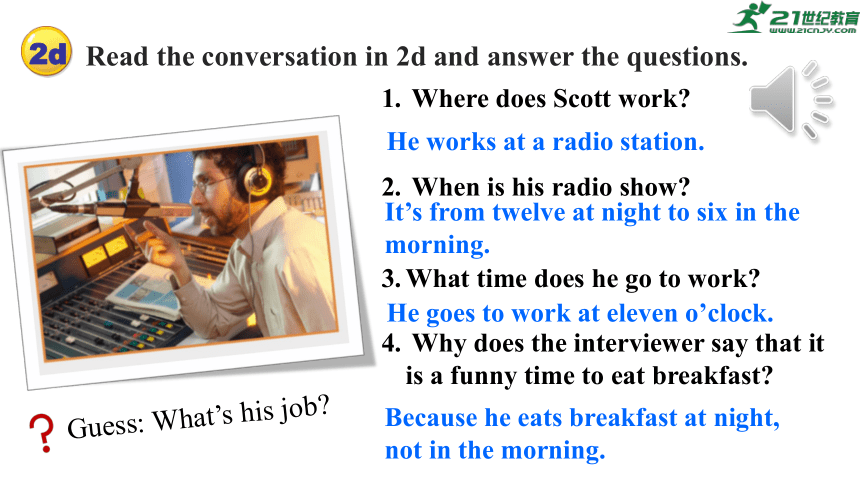

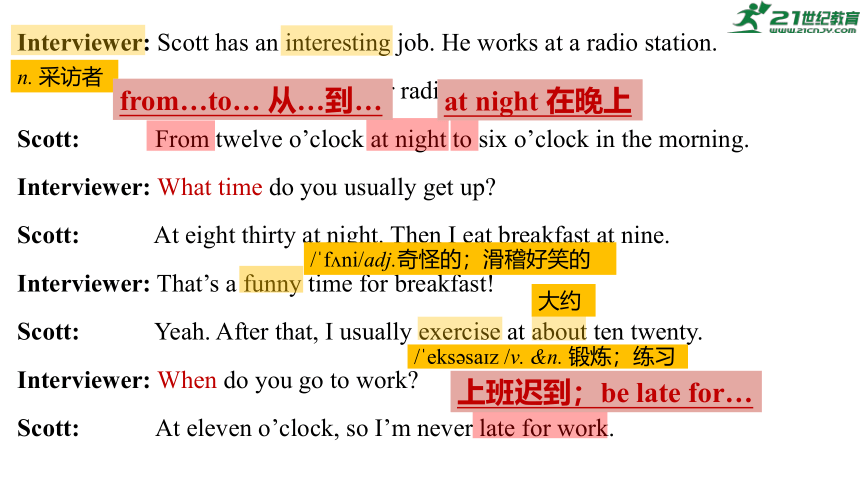

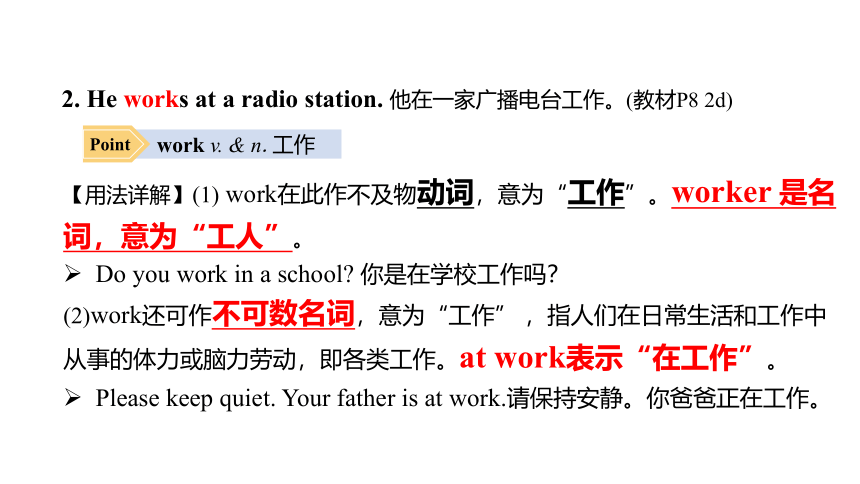

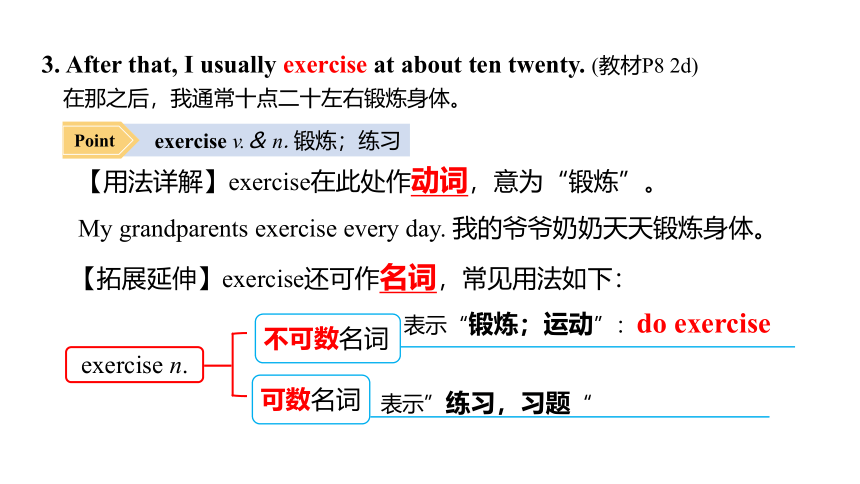
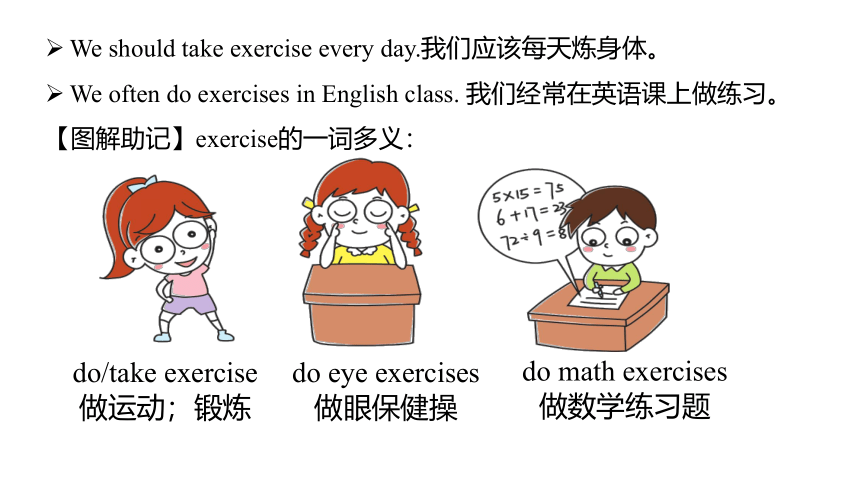
文档简介
(共25张PPT)
Unit 2 What time do you go to school
Section A 2d-Grammar focus 3c
2d
Guess: What’s his job
Read the conversation in 2d and answer the questions.
Where does Scott work
When is his radio show
What time does he go to work
Why does the interviewer say that it is a funny time to eat breakfast
He works at a radio station.
It’s from twelve at night to six in the morning.
He goes to work at eleven o’clock.
Because he eats breakfast at night, not in the morning.
Time Daily Activities
8:30 p.m. get up
9:00 p.m.
go to work
10:20 p.m.
eat breakfast
11:00 p.m.
exercise
2d
Read the conversation in 2d and fill in Scott’s schedule.
Interviewer: Scott has an interesting job. He works at a radio station.
Scott, what time is your radio show
Scott: From twelve o’clock at night to six o’clock in the morning.
Interviewer: What time do you usually get up
Scott: At eight thirty at night. Then I eat breakfast at nine.
Interviewer: That’s a funny time for breakfast!
Scott: Yeah. After that, I usually exercise at about ten twenty.
Interviewer: When do you go to work
Scott: At eleven o’clock, so I’m never late for work.
at night 在晚上
/ f ni/adj.奇怪的;滑稽好笑的
/ eks sa z /v. &n. 锻炼;练习
n. 采访者
from…to… 从…到…
大约
上班迟到;be late for…
【用法详解】job作可数名词,指具体的职业或工作。
She wants to find a job in Shanghai. 她想在上海找一份工作。
【拓展延伸】“Good job!” 常用于口语中,意为“做得好!“,常用来赞扬对方。
—Mom, I finish cleaning my room. 妈妈,我打扫完我的房间了。
—Good job! 干得好!
job n. 工作; 职业
Point
Language points
1. Scott has an interesting job. 斯科特有一份有趣的工作。 (教材P8 2d)
2. He works at a radio station. 他在一家广播电台工作。(教材P8 2d)
【用法详解】(1) work在此作不及物动词,意为“工作”。worker 是名词,意为“工人”。
Do you work in a school 你是在学校工作吗?
(2)work还可作不可数名词,意为“工作” ,指人们在日常生活和工作中从事的体力或脑力劳动,即各类工作。at work表示“在工作”。
Please keep quiet. Your father is at work.请保持安静。你爸爸正在工作。
work v. & n.工作
Point
【易混辨析】work与job
两者作名词,都可意为“工作”,但意义有所区别。
work 不可数名词 泛指抽象意义的工作。
job 可数名词 指具体的某种工作或职业。
My brother has a job(n. ). He is a worker(n. ) and works(v. ) in a factory. He likes his work(n. ) very much. 我哥哥有一份工作。他是一名工人,在一家工厂工作。他非常喜欢他的工作。
语境串记
3. After that, I usually exercise at about ten twenty. (教材P8 2d)
在那之后,我通常十点二十左右锻炼身体。
【用法详解】exercise在此处作动词,意为“锻炼”。
My grandparents exercise every day. 我的爷爷奶奶天天锻炼身体。
【拓展延伸】exercise还可作名词,常见用法如下:
exercise v.& n.锻炼;练习
Point
exercise n.
不可数名词
可数名词
表示“锻炼;运动”:do exercise
表示”练习,习题“
We should take exercise every day.我们应该每天炼身体。
We often do exercises in English class. 我们经常在英语课上做练习。
【图解助记】exercise的一词多义:
do/take exercise
做运动;锻炼
do eye exercises
做眼保健操
do math exercises
做数学练习题
Revision: look and say
—What time does he usually...
—He usually... at...
6:40
7:30
7:10
Revision: look and say
—What time does he usually...
—He usually... at...
17:30
19:30
如何对时间进行提问?有何不同?
提问时间有两种方式,一种是what time,一种是when。 what time问题的回答仅仅为时刻,而针对when问题的回答还可以是更笼统的时间
What time do you usually get up I usually get up at six thirty.
What time do they get dressed They always get dressed at seven twenty.
What time does Rick eat breakfast He eats breakfast at seven o’clock.
When does Scott go to work He always goes to work at eleven o’clock.
He’s never late.
When do your friends exercise They usually exercise on weekends.
Presentation
what time与when都可以用来提问时间,表示“什么时候”,其不同点为:
what time 其问句的回答只能是具体的时刻。
when 其问句的回答可以是具体的时刻,也可以是年份、月份、日期等更笼统的时间。
Presentation
what time/when引导的特殊疑问句的句式结构及回答
句式结构:What time/When + do/does +主语+动词原形+其他?
What time/When + be动词+主语+其他?
回答what time或when引导的问句,可以用in, on或at等组成的表示时间的介词短语。
【特别提醒】主语是第三人称单数时,问句中的助动词用does,实义动词用原形;答语中的谓语动词用第三人称单数形式。
Presentation
—When is his birthday 他的生日在什么时候?
— In May. 在五月。
— What time does Mary go to bed 玛丽几点上床睡觉?
— She goes to bed at 9:30 p. m. 她晚上九点半上床睡觉。
—When do you usually eat breakfast
你通常什么时候吃早饭?
—I usually eat breakfast at seven o’clock in the morning.
我通常早上七点吃早饭。
频率副词与动词的位置有何关系?
频率副词常位于实义动词之前,be动词之后。
What time do you usually get up I usually get up at six thirty.
What time do they get dressed They always get dressed at seven twenty.
What time does Rick eat breakfast He eats breakfast at seven o’clock.
When does Scott go to work He always goes to work at eleven o’clock.
He’s never late.
When do your friends exercise They usually exercise on weekends.
Presentation
频率副词
Presentation
never
usually
always
从不
很少
有时
经常
通常
总是
0%
20%
40%
60%
80%
100%
seldom
sometimes
频率副词一般位于be动词之后,实义动词之前。有时为了强调,频率副词也可位于句首。
My father is always busy. 我爸爸总是很忙。
She often plays the piano after dinner. 晚饭后,她经常弹钢琴。
Sometimes it rains heavily. 有时候雨下得很大。
【拓展延伸】对频率提问,用how often,表示“多久一次”。
—How often do you eat French fries 你多久吃一次炸薯条?
—Never. (我)从不吃。
Presentation
Write answers or questions. Use always, usually or never.
1. What time do you get up on school days
__________________________________.
2. __________________________________
Rick always gets up at 6:20.
3. What time do you have breakfast
___________________________________.
3a
上学日,前面用介词on
同eat breakfast
I usually get up at 6:30
What time does Rick get up
I usually have breakfast at 6:45
Practice
4. _____________________________________
Anna never eats breakfast.
5. What time does your best friend go to school
______________________________________.
What time/When does Anna eat breakfast
He/She goes to school at 7:15
I always eat breakfast at seven o’clock in the morning.
I usually go to bed at ten thirty at night.
I never watch TV on school days.
Write about something you always do, something you usually do and something you never do.
I always_____________________________________.
I usually_____________________________________.
I never______________________________________.
3b
exercise in the evening
go to school at 6:30
go to bed at 9:30
Practice
【用法详解】group 是集体名词,作主语时,若看作一个整体,谓语动词用单数形式;若强调其中的成员,则谓语动词用复数形式。
Our group has some good players. 我们组有一些优秀的球员。
用单数
The whole group are young. 整个小组的成员都很年轻。
用复数
1. In our group, Li Fei usually gets up late on weekends. (教材 P9 3c)
在我们组,李菲在周末通常起床晚。
Language points
group n. 组;群
Point
【拓展延伸】group的相关短语:
a group of 一群……,后接可数名词复数,作主语时,谓语动词用复数形式。
A group of students are cleaning the classroom. 一群学生正在打扫教室。
(2) in groups 分组
They study in groups. 他们分小组学习。
Exercises
1
2
3
—Do you like going mountain climbing
— Yes. I ____ do it on weekends with my friends.
A. seldom B. often C. never
B
C
C
—_____do you get up every morning
—At seven thirty.
A. What color B. What size C. What time
We’ll have to say goodbye, my dear friends! But I will _____ forget the days we spent together.
A. always B. often C. never
一、单项选择
二、按要求改写句子,每空一词
Jim usually watches TV at eight in the evening.(对画线部分提问)
______ ______ does Jim usually watch TV in the evening
Alice always cleans her room on weekends. (对画线部分提问)
______does Alice always clean her room
When does your brother go to school (改为同义句)
______ ______does your brother go to school.
What
time
When
What
time
1
2
3
Unit 2 What time do you go to school
Section A 2d-Grammar focus 3c
2d
Guess: What’s his job
Read the conversation in 2d and answer the questions.
Where does Scott work
When is his radio show
What time does he go to work
Why does the interviewer say that it is a funny time to eat breakfast
He works at a radio station.
It’s from twelve at night to six in the morning.
He goes to work at eleven o’clock.
Because he eats breakfast at night, not in the morning.
Time Daily Activities
8:30 p.m. get up
9:00 p.m.
go to work
10:20 p.m.
eat breakfast
11:00 p.m.
exercise
2d
Read the conversation in 2d and fill in Scott’s schedule.
Interviewer: Scott has an interesting job. He works at a radio station.
Scott, what time is your radio show
Scott: From twelve o’clock at night to six o’clock in the morning.
Interviewer: What time do you usually get up
Scott: At eight thirty at night. Then I eat breakfast at nine.
Interviewer: That’s a funny time for breakfast!
Scott: Yeah. After that, I usually exercise at about ten twenty.
Interviewer: When do you go to work
Scott: At eleven o’clock, so I’m never late for work.
at night 在晚上
/ f ni/adj.奇怪的;滑稽好笑的
/ eks sa z /v. &n. 锻炼;练习
n. 采访者
from…to… 从…到…
大约
上班迟到;be late for…
【用法详解】job作可数名词,指具体的职业或工作。
She wants to find a job in Shanghai. 她想在上海找一份工作。
【拓展延伸】“Good job!” 常用于口语中,意为“做得好!“,常用来赞扬对方。
—Mom, I finish cleaning my room. 妈妈,我打扫完我的房间了。
—Good job! 干得好!
job n. 工作; 职业
Point
Language points
1. Scott has an interesting job. 斯科特有一份有趣的工作。 (教材P8 2d)
2. He works at a radio station. 他在一家广播电台工作。(教材P8 2d)
【用法详解】(1) work在此作不及物动词,意为“工作”。worker 是名词,意为“工人”。
Do you work in a school 你是在学校工作吗?
(2)work还可作不可数名词,意为“工作” ,指人们在日常生活和工作中从事的体力或脑力劳动,即各类工作。at work表示“在工作”。
Please keep quiet. Your father is at work.请保持安静。你爸爸正在工作。
work v. & n.工作
Point
【易混辨析】work与job
两者作名词,都可意为“工作”,但意义有所区别。
work 不可数名词 泛指抽象意义的工作。
job 可数名词 指具体的某种工作或职业。
My brother has a job(n. ). He is a worker(n. ) and works(v. ) in a factory. He likes his work(n. ) very much. 我哥哥有一份工作。他是一名工人,在一家工厂工作。他非常喜欢他的工作。
语境串记
3. After that, I usually exercise at about ten twenty. (教材P8 2d)
在那之后,我通常十点二十左右锻炼身体。
【用法详解】exercise在此处作动词,意为“锻炼”。
My grandparents exercise every day. 我的爷爷奶奶天天锻炼身体。
【拓展延伸】exercise还可作名词,常见用法如下:
exercise v.& n.锻炼;练习
Point
exercise n.
不可数名词
可数名词
表示“锻炼;运动”:do exercise
表示”练习,习题“
We should take exercise every day.我们应该每天炼身体。
We often do exercises in English class. 我们经常在英语课上做练习。
【图解助记】exercise的一词多义:
do/take exercise
做运动;锻炼
do eye exercises
做眼保健操
do math exercises
做数学练习题
Revision: look and say
—What time does he usually...
—He usually... at...
6:40
7:30
7:10
Revision: look and say
—What time does he usually...
—He usually... at...
17:30
19:30
如何对时间进行提问?有何不同?
提问时间有两种方式,一种是what time,一种是when。 what time问题的回答仅仅为时刻,而针对when问题的回答还可以是更笼统的时间
What time do you usually get up I usually get up at six thirty.
What time do they get dressed They always get dressed at seven twenty.
What time does Rick eat breakfast He eats breakfast at seven o’clock.
When does Scott go to work He always goes to work at eleven o’clock.
He’s never late.
When do your friends exercise They usually exercise on weekends.
Presentation
what time与when都可以用来提问时间,表示“什么时候”,其不同点为:
what time 其问句的回答只能是具体的时刻。
when 其问句的回答可以是具体的时刻,也可以是年份、月份、日期等更笼统的时间。
Presentation
what time/when引导的特殊疑问句的句式结构及回答
句式结构:What time/When + do/does +主语+动词原形+其他?
What time/When + be动词+主语+其他?
回答what time或when引导的问句,可以用in, on或at等组成的表示时间的介词短语。
【特别提醒】主语是第三人称单数时,问句中的助动词用does,实义动词用原形;答语中的谓语动词用第三人称单数形式。
Presentation
—When is his birthday 他的生日在什么时候?
— In May. 在五月。
— What time does Mary go to bed 玛丽几点上床睡觉?
— She goes to bed at 9:30 p. m. 她晚上九点半上床睡觉。
—When do you usually eat breakfast
你通常什么时候吃早饭?
—I usually eat breakfast at seven o’clock in the morning.
我通常早上七点吃早饭。
频率副词与动词的位置有何关系?
频率副词常位于实义动词之前,be动词之后。
What time do you usually get up I usually get up at six thirty.
What time do they get dressed They always get dressed at seven twenty.
What time does Rick eat breakfast He eats breakfast at seven o’clock.
When does Scott go to work He always goes to work at eleven o’clock.
He’s never late.
When do your friends exercise They usually exercise on weekends.
Presentation
频率副词
Presentation
never
usually
always
从不
很少
有时
经常
通常
总是
0%
20%
40%
60%
80%
100%
seldom
sometimes
频率副词一般位于be动词之后,实义动词之前。有时为了强调,频率副词也可位于句首。
My father is always busy. 我爸爸总是很忙。
She often plays the piano after dinner. 晚饭后,她经常弹钢琴。
Sometimes it rains heavily. 有时候雨下得很大。
【拓展延伸】对频率提问,用how often,表示“多久一次”。
—How often do you eat French fries 你多久吃一次炸薯条?
—Never. (我)从不吃。
Presentation
Write answers or questions. Use always, usually or never.
1. What time do you get up on school days
__________________________________.
2. __________________________________
Rick always gets up at 6:20.
3. What time do you have breakfast
___________________________________.
3a
上学日,前面用介词on
同eat breakfast
I usually get up at 6:30
What time does Rick get up
I usually have breakfast at 6:45
Practice
4. _____________________________________
Anna never eats breakfast.
5. What time does your best friend go to school
______________________________________.
What time/When does Anna eat breakfast
He/She goes to school at 7:15
I always eat breakfast at seven o’clock in the morning.
I usually go to bed at ten thirty at night.
I never watch TV on school days.
Write about something you always do, something you usually do and something you never do.
I always_____________________________________.
I usually_____________________________________.
I never______________________________________.
3b
exercise in the evening
go to school at 6:30
go to bed at 9:30
Practice
【用法详解】group 是集体名词,作主语时,若看作一个整体,谓语动词用单数形式;若强调其中的成员,则谓语动词用复数形式。
Our group has some good players. 我们组有一些优秀的球员。
用单数
The whole group are young. 整个小组的成员都很年轻。
用复数
1. In our group, Li Fei usually gets up late on weekends. (教材 P9 3c)
在我们组,李菲在周末通常起床晚。
Language points
group n. 组;群
Point
【拓展延伸】group的相关短语:
a group of 一群……,后接可数名词复数,作主语时,谓语动词用复数形式。
A group of students are cleaning the classroom. 一群学生正在打扫教室。
(2) in groups 分组
They study in groups. 他们分小组学习。
Exercises
1
2
3
—Do you like going mountain climbing
— Yes. I ____ do it on weekends with my friends.
A. seldom B. often C. never
B
C
C
—_____do you get up every morning
—At seven thirty.
A. What color B. What size C. What time
We’ll have to say goodbye, my dear friends! But I will _____ forget the days we spent together.
A. always B. often C. never
一、单项选择
二、按要求改写句子,每空一词
Jim usually watches TV at eight in the evening.(对画线部分提问)
______ ______ does Jim usually watch TV in the evening
Alice always cleans her room on weekends. (对画线部分提问)
______does Alice always clean her room
When does your brother go to school (改为同义句)
______ ______does your brother go to school.
What
time
When
What
time
1
2
3
同课章节目录
- Unit 1 Can you play the guitar?
- Section A
- Section B
- Unit 2 What time do you go to school?
- Section A
- Section B
- Unit 3 How do you get to school?
- Section A
- Section B
- Unit 4 Don't eat in class.
- Section A
- Section B
- Unit 5 Why do you like pandas?
- Section A
- Section B
- Unit 6 I'm watching TV.
- Section A
- Section B
- Review of Units 1-6
- Unit 7 It's raining!
- Section A
- Section B
- Unit 8 Is there a post office near here?
- Section A
- Section B
- Unit 9 What does he look like?
- Section A
- Section B
- Unit 10 I'd like some noodles.
- Section A
- Section B
- Unit 11 How was your school trip?
- Section A
- Section B
- Unit 12 What did you do last weekend?
- Section A
- Section B
